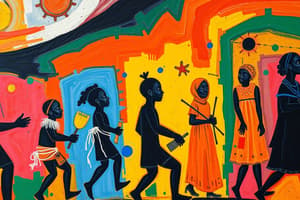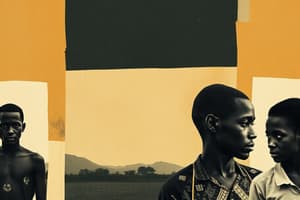Podcast
Questions and Answers
What was a key outcome of the Berlin Conference of 1884?
What was a key outcome of the Berlin Conference of 1884?
- It resulted in the division of Africa among European powers. (correct)
- It led to the establishment of an independent African nation.
- It fostered cooperation between European powers and African leaders.
- It resolved all disputes between European powers regarding African colonization.
Which of the following statements is TRUE regarding the impact of European colonization on Africa?
Which of the following statements is TRUE regarding the impact of European colonization on Africa?
- European colonization often resulted in dependence on agriculture and traditional ways of income. (correct)
- European colonization improved the living standards of the majority of African populations.
- European colonization led to greater political stability in Africa.
- European colonization promoted economic diversification in African countries.
- European colonization brought about technological advancement in Africa.
What is a key difference between the First and Second Republics in Rwanda between 1963 - 1990?
What is a key difference between the First and Second Republics in Rwanda between 1963 - 1990?
- The First Republic saw a Tutsi invasion, while the Second Republic saw a Hutu invasion.
- The Second Republic was marked by a peaceful transition of power, while the First Republic experienced a violent coup. (correct)
- The First Republic was characterized by a more democratic system, while the Second Republic was more authoritarian.
- The Second Republic promoted a system of communal ownership, whereas the First Republic promoted private ownership.
- The First Republic saw the beginning of the Rwandan genocide while the Second Republic saw the genocide intensifying.
What was a major consequence of the Rwandan genocide?
What was a major consequence of the Rwandan genocide?
What were the main goals of the European powers who attended the Berlin Conference?
What were the main goals of the European powers who attended the Berlin Conference?
How did King Leopold II of Belgium gain control of the Congo?
How did King Leopold II of Belgium gain control of the Congo?
What were some of the positive impacts of modernization in Rwanda?
What were some of the positive impacts of modernization in Rwanda?
Which of these were negative impacts of modernization on Rwanda?
Which of these were negative impacts of modernization on Rwanda?
What was the main ethnic group that dominated the Rwandan population before the genocide?
What was the main ethnic group that dominated the Rwandan population before the genocide?
Which event marked the assassination of the Rwandan president that escalated the genocide?
Which event marked the assassination of the Rwandan president that escalated the genocide?
What percentage of the Rwandan population was Tutsi prior to the genocide?
What percentage of the Rwandan population was Tutsi prior to the genocide?
Which country did not get involved in the Rwandan genocide, despite being a major world power?
Which country did not get involved in the Rwandan genocide, despite being a major world power?
What led to the historical ethnic tensions between Hutus and Tutsis?
What led to the historical ethnic tensions between Hutus and Tutsis?
What is one reason for European imperialism in Africa mentioned in the background?
What is one reason for European imperialism in Africa mentioned in the background?
Who was the leader of Rwanda following the genocide?
Who was the leader of Rwanda following the genocide?
Which group of people collaborated with European powers during colonialism for personal gain?
Which group of people collaborated with European powers during colonialism for personal gain?
What was one of the policies of Germany in East Africa during the 19th century?
What was one of the policies of Germany in East Africa during the 19th century?
Which group was favored by European colonizers in Rwanda, leading to social divisions?
Which group was favored by European colonizers in Rwanda, leading to social divisions?
What significant impact did colonial rule have on the local leadership in Rwanda?
What significant impact did colonial rule have on the local leadership in Rwanda?
What was the purpose of the ID card and registration system set up by Belgium in Rwanda?
What was the purpose of the ID card and registration system set up by Belgium in Rwanda?
What was a primary goal of the UNAR party founded in 1959?
What was a primary goal of the UNAR party founded in 1959?
What was the primary economic legacy of colonialism in Rwanda?
What was the primary economic legacy of colonialism in Rwanda?
Which characteristic was commonly associated with the Tutsi ethnic group?
Which characteristic was commonly associated with the Tutsi ethnic group?
Which political group advocated against the Tutsi minority and promoted Hutu power?
Which political group advocated against the Tutsi minority and promoted Hutu power?
What was the main purpose of the Kangura magazine during the early 90s in Rwanda?
What was the main purpose of the Kangura magazine during the early 90s in Rwanda?
Which extremist group is known for creating the dehumanizing rumor that referred to Tutsis as 'cockroaches'?
Which extremist group is known for creating the dehumanizing rumor that referred to Tutsis as 'cockroaches'?
What was one of the key roles of the RTLM during the Rwandan genocide?
What was one of the key roles of the RTLM during the Rwandan genocide?
Which aspect of the RTLM made it particularly effective in spreading its message?
Which aspect of the RTLM made it particularly effective in spreading its message?
Who was the leader of the RPF during the conflict in the late 1980s?
Who was the leader of the RPF during the conflict in the late 1980s?
Which of the following groups was known to influence President Habyarimana and was identified as the elite in the Rwandan government?
Which of the following groups was known to influence President Habyarimana and was identified as the elite in the Rwandan government?
In what way did the RTLM broadcast act as a guide during the genocide?
In what way did the RTLM broadcast act as a guide during the genocide?
What term describes a source produced long after an event and utilizing various earlier sources?
What term describes a source produced long after an event and utilizing various earlier sources?
Flashcards
Hutu Population Percentage
Hutu Population Percentage
Hutus make up 85% of Rwanda's population.
Tutsi Population Percentage
Tutsi Population Percentage
Tutsis account for 14% of Rwanda's population.
Belgian Colonial Rule
Belgian Colonial Rule
Belgian authorities favored Tutsi minority over Hutu majority (1916-1962).
Rwandan Genocide Death Toll
Rwandan Genocide Death Toll
Signup and view all the flashcards
RPF
RPF
Signup and view all the flashcards
Assassination of Habyarimana
Assassination of Habyarimana
Signup and view all the flashcards
Paul Kagame
Paul Kagame
Signup and view all the flashcards
Reasons for Imperialism
Reasons for Imperialism
Signup and view all the flashcards
Tutsi
Tutsi
Signup and view all the flashcards
Hutu
Hutu
Signup and view all the flashcards
Colonialism
Colonialism
Signup and view all the flashcards
Indoctrination
Indoctrination
Signup and view all the flashcards
Domino Effect
Domino Effect
Signup and view all the flashcards
Parmehutu
Parmehutu
Signup and view all the flashcards
UNAR
UNAR
Signup and view all the flashcards
Colonial Economic Legacy
Colonial Economic Legacy
Signup and view all the flashcards
Primary Source
Primary Source
Signup and view all the flashcards
Secondary Source
Secondary Source
Signup and view all the flashcards
Tertiary Source
Tertiary Source
Signup and view all the flashcards
Propaganda
Propaganda
Signup and view all the flashcards
RTLM
RTLM
Signup and view all the flashcards
Interahamwe
Interahamwe
Signup and view all the flashcards
Akazu
Akazu
Signup and view all the flashcards
Genocide
Genocide
Signup and view all the flashcards
Positive effects of colonization
Positive effects of colonization
Signup and view all the flashcards
Negative effects of colonization
Negative effects of colonization
Signup and view all the flashcards
Rwanda's independence
Rwanda's independence
Signup and view all the flashcards
The Berlin Conference
The Berlin Conference
Signup and view all the flashcards
King Leopold II
King Leopold II
Signup and view all the flashcards
Impact of the Civil War 1973-90
Impact of the Civil War 1973-90
Signup and view all the flashcards
European colonization of Africa
European colonization of Africa
Signup and view all the flashcards
Consequences of political instability
Consequences of political instability
Signup and view all the flashcards
Study Notes
Rwanda and African Colonies (1990-1998)
- Case Study 1: Rwanda (1990-1998)
- Causes of Conflict:
- Ethnic tensions between Hutus (85%) and Tutsis (14%)
- Creation of the Hutu power movement and Interahamwe
- Role of the media
- Economic situation
- Colonial legacy
- Rwandan civil war (1990-1993)
- Assassination of Habyarimana and Naryamira (1994)
- Course and Interventions:
- Actions of the Rwandan Patriotic Front (RPF)
- Rwandan government actions
- Nature of the genocide and other crimes against humanity (war rape)
- Response of the international community (UNAMIR)
- Inaction/role of France, Belgium, and the US
- Impact:
- Social impact (refugee crisis, justice, reconciliation)
- International impact (International Criminal Tribunal for Rwanda)
- Political and economic impact (RPF-led governments, continued warfare in DRC)
- Causes of Conflict:
Introduction/Background
- Pre-genocide ethnic tension
- Longstanding tension between Hutu (85%)and Tutsi (14%) populations.
- Colonial rule (1916-1962)
- Intensified existing divisions, favoring the Tutsi minority.
- Post-independence (1962)
- Hutu-led government policies discriminated against Tutsis, including pogroms
Brief Introduction Questions
- Casualties: 491,000–800,000 Tutsis and 10,000 Twa.
- Hutu Population Percentage: 85%.
- Political Domination: Hutu élite (85%) and Tutsi (14%).
- Overthrow of Monarchy: 1959.
- Tutsi Refugee Groups (1980s): Initial only
Timeline
- 1990: Invasion of Rwanda
- 1993: Peace Accord
- April 1994: Assassination of Habyarimana
- July 1994: RPF takes Kigali
European Influence in Africa
- Scramble for Africa (1880-1914): European powers' colonization of Africa's resources and people, often establishing colonial systems.
Reasons for Imperialism
- Economic: Access to resources (diamonds, cobalt, slaves) and growth of European economies.
- Social: Spreading culture, religion, and racial ideologies ("White man's burden")
- Military: Asserting national power through military presence and bases.
- Individual Interests: Personal gain for some individuals and their beliefs
Perspectives on Colonialism
- Tutsi: Minority group, often richer and better educated, favored by some European colonizers.
- Hutu: Majority group, experiencing discrimination and potentially poverty due to prior Tutsi favor.
- Germany (19th Century): Brutal repression of opposition.
- Belgium (19th Century): Promoted Tutsis in leadership, developed technology like ID cards to divide Tutsi and Hutu, considered to be "superior".
Impact of Colonialism on Rwanda
- Identity Cards: Implemented to separate Tutsi and Hutu, separating and classifying them.
- Ethnic-Based Classification: Weakened local leaders.
- Christianization: Spread of the religion
- Western Education and Political Power: Increased education and political power for Tutsi populations
UNAR (20th Century)
- Advocated for Rwandan rights and perseverance.
The Two Republics (1963-90)
- Rwanda gained independence in 1960, leading to subsequent anti-Tutsi backlashes and violence.
Berlin Conference (1884)
- Meeting of European powers to divide and claim African territories, without African representation.
Extremist Groups
- Interahamwe: Created rumors.
- CDR:
- Parmehutu:
- Impuzamugambi:
- MRND: Rwanda's single legal party (1978-1991)
Tools of Propaganda
- Kangura Magazine: Early 1990s magazine that spread hate and propaganda.
- RTLM: Radio station that spread hate and propaganda and incited violence against Tutsis.
After the Genocide
- Punishment of radio personalities involved in spreading genocide propaganda and violence
Studying That Suits You
Use AI to generate personalized quizzes and flashcards to suit your learning preferences.




